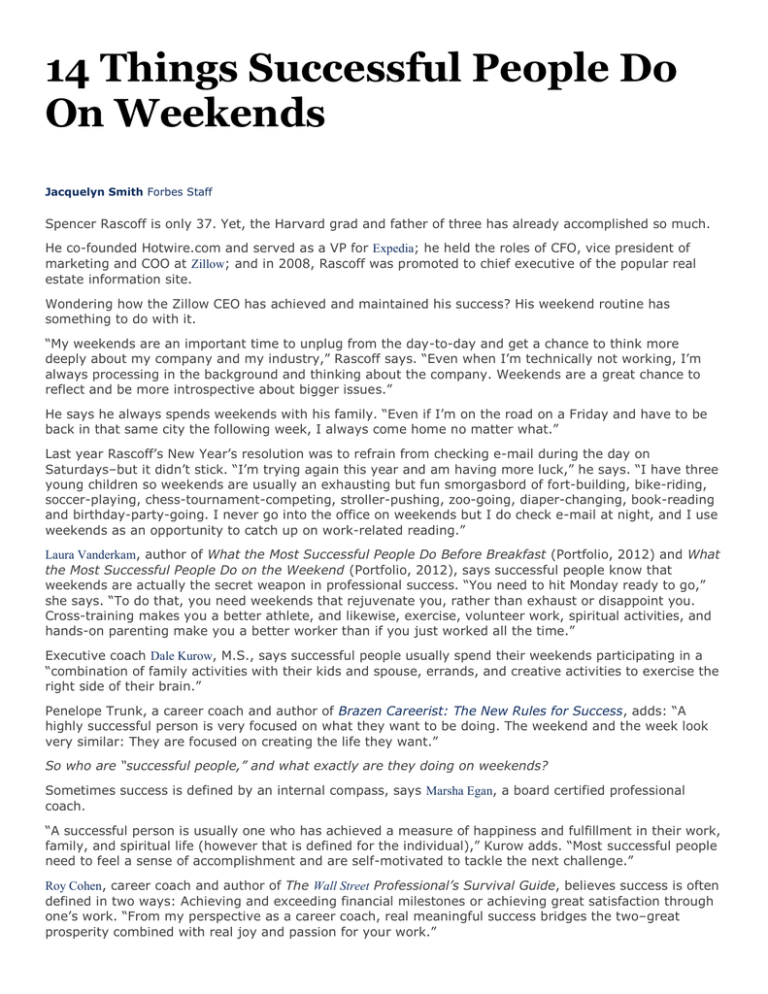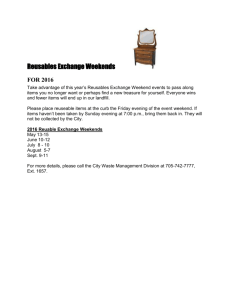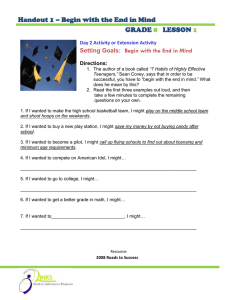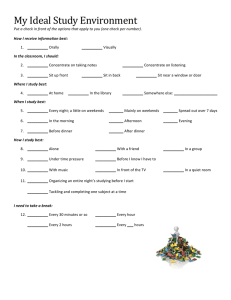14 Things Successful People Do On Weekends
advertisement

14 Things Successful People Do On Weekends Jacquelyn Smith Forbes Staff Spencer Rascoff is only 37. Yet, the Harvard grad and father of three has already accomplished so much. He co-founded Hotwire.com and served as a VP for Expedia; he held the roles of CFO, vice president of marketing and COO at Zillow; and in 2008, Rascoff was promoted to chief executive of the popular real estate information site. Wondering how the Zillow CEO has achieved and maintained his success? His weekend routine has something to do with it. “My weekends are an important time to unplug from the day-to-day and get a chance to think more deeply about my company and my industry,” Rascoff says. “Even when I’m technically not working, I’m always processing in the background and thinking about the company. Weekends are a great chance to reflect and be more introspective about bigger issues.” He says he always spends weekends with his family. “Even if I’m on the road on a Friday and have to be back in that same city the following week, I always come home no matter what.” Last year Rascoff’s New Year’s resolution was to refrain from checking e-mail during the day on Saturdays–but it didn’t stick. “I’m trying again this year and am having more luck,” he says. “I have three young children so weekends are usually an exhausting but fun smorgasbord of fort-building, bike-riding, soccer-playing, chess-tournament-competing, stroller-pushing, zoo-going, diaper-changing, book-reading and birthday-party-going. I never go into the office on weekends but I do check e-mail at night, and I use weekends as an opportunity to catch up on work-related reading.” Laura Vanderkam, author of What the Most Successful People Do Before Breakfast (Portfolio, 2012) and What the Most Successful People Do on the Weekend (Portfolio, 2012), says successful people know that weekends are actually the secret weapon in professional success. “You need to hit Monday ready to go,” she says. “To do that, you need weekends that rejuvenate you, rather than exhaust or disappoint you. Cross-training makes you a better athlete, and likewise, exercise, volunteer work, spiritual activities, and hands-on parenting make you a better worker than if you just worked all the time.” Executive coach Dale Kurow, M.S., says successful people usually spend their weekends participating in a “combination of family activities with their kids and spouse, errands, and creative activities to exercise the right side of their brain.” Penelope Trunk, a career coach and author of Brazen Careerist: The New Rules for Success, adds: “A highly successful person is very focused on what they want to be doing. The weekend and the week look very similar: They are focused on creating the life they want.” So who are “successful people,” and what exactly are they doing on weekends? Sometimes success is defined by an internal compass, says Marsha Egan, a board certified professional coach. “A successful person is usually one who has achieved a measure of happiness and fulfillment in their work, family, and spiritual life (however that is defined for the individual),” Kurow adds. “Most successful people need to feel a sense of accomplishment and are self-motivated to tackle the next challenge.” Roy Cohen, career coach and author of The Wall Street Professional’s Survival Guide, believes success is often defined in two ways: Achieving and exceeding financial milestones or achieving great satisfaction through one’s work. “From my perspective as a career coach, real meaningful success bridges the two–great prosperity combined with real joy and passion for your work.” 1. Make time for family and friends. This is especially important for those who don’t spend much time with their loved ones during the week. 2. Exercise. Everyone needs to do it, and if you can’t work out 4 to 5 days during the workweek, you need to be active on weekends to make up for some of that time, Vanderkam says. It’s the perfect opportunity to clear you mind and create fresh ideas. “I know an owner of a PR firm who takes walks in the park with his dog to spark ideas about how to pitch a new client, or what angle to take with the press for a story,” Kurow says. Cohen suggests spin classes and outdoor cycling in the warmer months. “Both are energizing and can be organized among people with shared interests. For example, it is not uncommon for hedge fund folks and Wall Street professionals to ride together on weekends. It is a great way to establish and cultivate relationships based on membership in this elite professional community.” 3. Pursue a passion. “There’s a creative director of a greeting card company who went back to school to pursue an MFA because of her love of art,” Kurow says. “Pursuing this passion turned into a love of poetry that she now writes on weekends.” “Successful people make time for what is important or fun,” Egan adds. “They make space for activities that add to their life balance.” 4. Vacation. Getting away for the weekend provides a great respite from the grind of an intense week at work, Cohen says. 5. Disconnect. The most successful people avoid e-mail for a period of time, Vanderkam says. “I’m not saying the whole weekend, but even just a walk without the phone can feel liberating. I advocate taking a ‘tech Sabbath.’ If you don’t have a specific religious obligation of no-work time, taking Saturday night to mid-day Sunday off is a nice, ecumenical time that works for many people.” 6. Volunteer. “I know a commercial real estate broker who volunteers to help with cook-off events whose proceeds are donated to the Food Bank,” Kurow says. “The volunteer work provides a balance to the heavy analytical work she does all week and fulfills her need to be creative — she designs the promotional material for the non-profit.” Cohen says a lot of successful people participate in fundraising events. “This is a great way to network and to meet others with similar interests,” he says. “The visibility also helps in branding a successful person as philanthropic.” 7. Avoid chores. Every weekend has a few have-to-dos, but you want these to take the minimum amount of time possible, Vanderkam explains. Create a small window for chores and errands, and then banish them from your mind the rest of the time. 8. Plan. “Planning makes people more effective, and doing it before the week starts means you can hit Monday ready to go, and means you’ll give clear directions to the people who work for you, so they will be ready to go, too,” Vanderkam says. Trunk agrees. She says successful people plan their month and year because “if you get stuck on short-term lists you don’t get anything big accomplished.” 9. Socialize. “Humans are social creatures, and studies of people’s experienced happiness through the day finds that socializing ranks right up there, not too far down below sex,” Vanderkam says. Go out with friends and family, or get involved in the local community. “It has been demonstrated that successful people find great satisfaction in giving back,” Cohen says. “Board membership, for example, also offers access to other successful folks.” 10. Gardening/crafts/games/sports/cooking/cultural activities. This is especially important for those cooped up in an office all week. “For the pure joy, some folks find great satisfaction in creating beautiful gardens,” Cohen says. Kurow knows an attorney who uses her weekends to garden and do mosaics and tile work to satisfy her creative side. “Filling her life this way enables her to be refreshed on Monday and ready to tackle the litigation and trial prep work. Artwork for her is fulfilling in a way that feeds her soul and her need to connect with her spiritual side.” Bridge lessons and groups can also sharpen the mind and often create relationships among highly competitive smart professionals, Cohen says. “I once saw a printout of a bridge club’s membership list; its members were a who’s who of Wall Street.” Theatre, opera and sporting events can also enrich one’s spirit, he adds. 11. Network. “Networking isn’t an event for a successful person, it’s a lifestyle,” Trunk says. Wherever they go and whatever they do, they manage to connect with new people. 12. Reflect. Egan says truly successful people make time on weekends to appreciate what they have and reflect on their happiness and accomplishments. As Rascoff said, “weekends are a great chance to reflect and be more introspective about bigger issues.” 13. Meditate. Classes and private instruction offer a bespoke approach to insight and peace of mind, Cohen says. “How better to equip yourself for success in this very tough world?” 14. Recharge. We live in a competitive world, Vanderkam says. “Peak performance requires managing downtime, too– with the goal of really recharging your batteries.” That’s how the most successful people get so much done. Successful people know that time is too precious to be totally leisurely about leisure, Vanderkam concludes. “You’re not going to waste that time by failing to think about what you’d like to do with it, and thus losing the weekend to TV, puttering, inefficient e-mail checking, and chores. If you don’t have a busy workweek, your weekend doesn’t matter so much. But if you’re going from 8 a.m. to 8 p.m. every day, it certainly does.”


